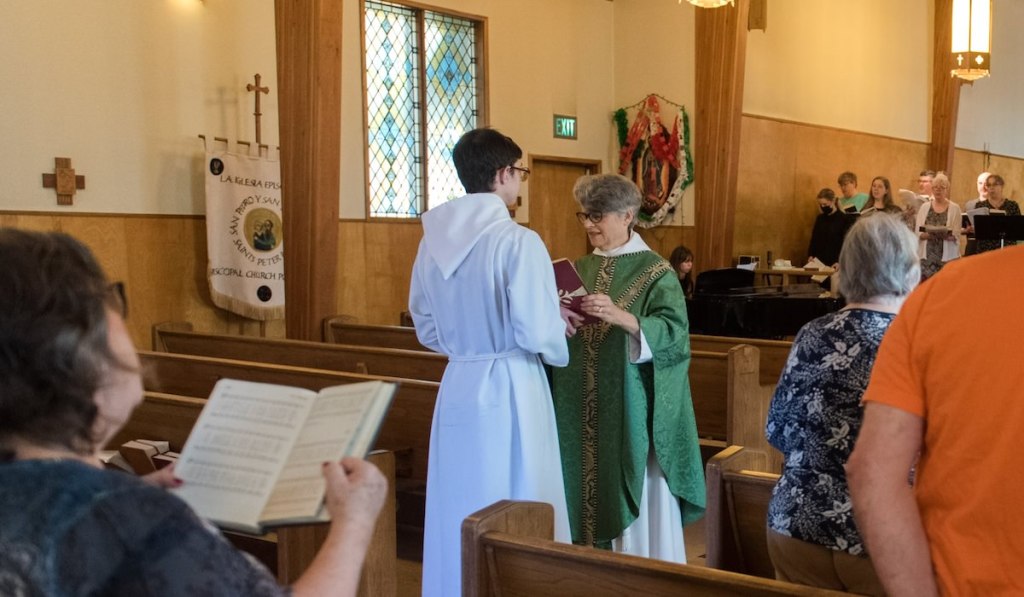For several years, the St. Peter and Paul Episcopal Church community investigated using their land at 247 SE 82nd Avenue for affordable housing. This week, church officials announced plans to discontinue religious services at the site and turn the property over to The Episcopal Church in Western Oregon (ECWO) to begin the site’s transformation towards that goal. A final celebration in the sanctuary will occur at 5 p.m. on December 3rd, with an open invitation for the community to attend. After several years of additional planning and permitting, demolition crews will raze the building at the nearly 100-year-old site to make room for residences.
The small congregation has long made the building and property available to supportive groups serving the vulnerable. As the housing crises forced more Portlanders onto the streets, adding attainable housing to the property along 82nd Avenue aligned with the faith group’s goals. Early concepts called for partial demolition of the building while retaining worship space or creating a new mixed-use structure. However, the economics and efficacy of adding housing to a shared site ultimately seemed unfeasible for the under-resourced congregation. Recognizing the urgent need for housing and St. Peter and Paul’s uncertain financial position led to the proposed dissolution.

The ECWO leadership will vote to dissolve this Montavilla church alongside two other Oregon congregations at their Annual Meeting on October 28th, 2023. The building could continue to have secular uses in the intervening years before its deconstruction. Ultimately, ECWO wants to provide a sustainable and accessible community resource in its place that addresses the housing, services, and relational needs of the neighborhood. However, until the project breaks ground, it is important to its new caretakers that the space remains active and useful. For two decades, Rahab’s Sisters has offered a safe drop-in center for female-identifying people marginalized by sex work, addiction, or poverty. That group intends to continue those efforts uninterrupted and could work from the building until they find a new permanent location. However, ECWO will determine what groups will have future use of the building within the coming weeks.
St. Peter and Paul’s Rector, Reverend Sara Fischer, understands that the classic church model has become financially unsustainable for smaller congregations, particularly those serving the poor. However, that societal shift will not impede her commitment to the community. A dedicated structure is not a requirement of Rev. Fischer’s work, and she intends to continue uncoupled from a building while staying embedded in the community. Overall, Rev. Fischer is excited to see the structures of her faith reimagined to support the immediate needs of vulnerable people. “I think that for churches, it’s really the wave of the future to use the property for something like affordable housing,” said Rev. Fischer. They need to “figure out how to be in a relationship with people providing some of what the church has to offer, but not the traditional churchy things.”

Substantial change for the St. Peter and Paul property will come years from now, near its 100th birthday. The first church building was erected at the site in 1926 as the St. Peter Episcopal Church and School, seven years after its founding. The St. Paul Episcopal Church was established in 1895 to serve the small town of Woodmere and later merged with the Montavilla congregation in 1968. At that time, the name changed to reflect the union. The next few years will see programs anchored at this site find other locations within the area while maintaining a connection to those seeking their services.
This transition is not occurring without some sense of loss. Around 20 worshipers will need to find their path to another congregation or expression of faith. A century of documents and records will transition out of the neighborhood to the Episcopal Diocese of Oregon’s care. Most notably, the demolition of the iconic church on 82nd Avenue will change the streetscape.
Despite the losses and years of impending change, the community will likely perceive this transition as positive. Providing affordable housing is overwhelmingly supported by Portlanders and is perceived as a critical step in addressing problems plaguing the city. The contribution of St. Peter and Paul’s land and ECWO’s commitment to creating around 100 attainable residential units should move the city closer to sheltering those living on the margins and provide a humane solution to the housing emergency.
Correction: A previous version of this article stated that Rahab’s Sisters was in the building for just one decade. They have operated there since 2003.
Promotion: Help keep independent news accessible to the community. Montavilla News has a Patreon account. We invite those who can contribute to this local news source to consider becoming paid subscribers or sponsors. We will always remain free to read regardless of subscription.
